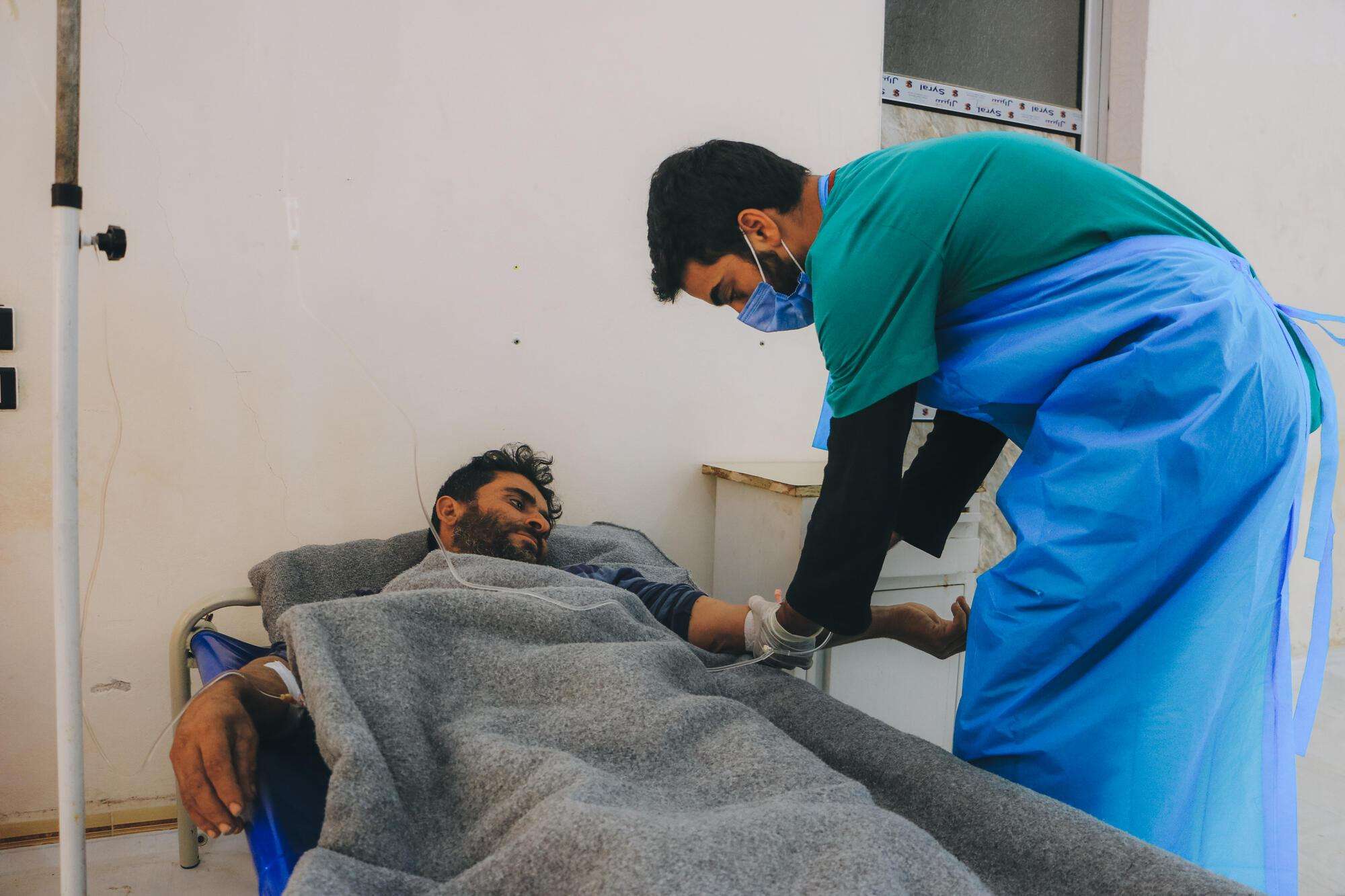In September 2022, a cholera outbreak was declared in Syria, including in the north of the country, where Doctors Without Borders/Médecins Sans Frontières (MSF) works. Our teams are responding to this outbreak by supporting health workers, caring for patients in dedicated facilities, and implementing prevention activities at the community level to limit the spread.
This outbreak has been linked to contaminated water from the Euphrates River in northeast Syria. It was further exacerbated by an acute water shortage and weak water and sanitation infrastructure decimated by years of armed conflict and decreased humanitarian funding. The cholera outbreak adds another layer of complexity to an already catastrophic humanitarian situation, with people living in northern Syria contending with another harsh winter, the unstable security situation, and the risk of disruption of cross-border aid.
As of November 20, 12,643 suspected cholera cases were reported in northwest Syria, including 11 deaths; 884 suspected cases in Tal Abyad and Ras Al-Ain, including 2 deaths; and 23,578 suspected cases in northeast Syria, including 30 deaths (according to Assistance Coordination Unit-ACU). MSF is closely monitoring the situation in coordination with local health authorities and other medical and humanitarian organizations and adapting our operations based on the needs.
Northeast Syria: Raqqa and Hassakah Governorates
It is morning in the war-ravaged but still bustling city of Raqqa in northeast Syria. Fatina, who is originally from Aleppo, is lying on her bed in an MSF-supported cholera treatment unit (CTU). She is still feeling weak, so a nurse is helping her drink an oral rehydration solution (ORS) from a cup as she recovers from cholera, a disease that hasn’t been seen in Syria for over a decade. Fatina came to visit her son, who moved to the city after fleeing the fighting in the northwest of the country ten years ago. But her hopes of a happy reunion were quickly dashed when she became ill shortly after arriving.
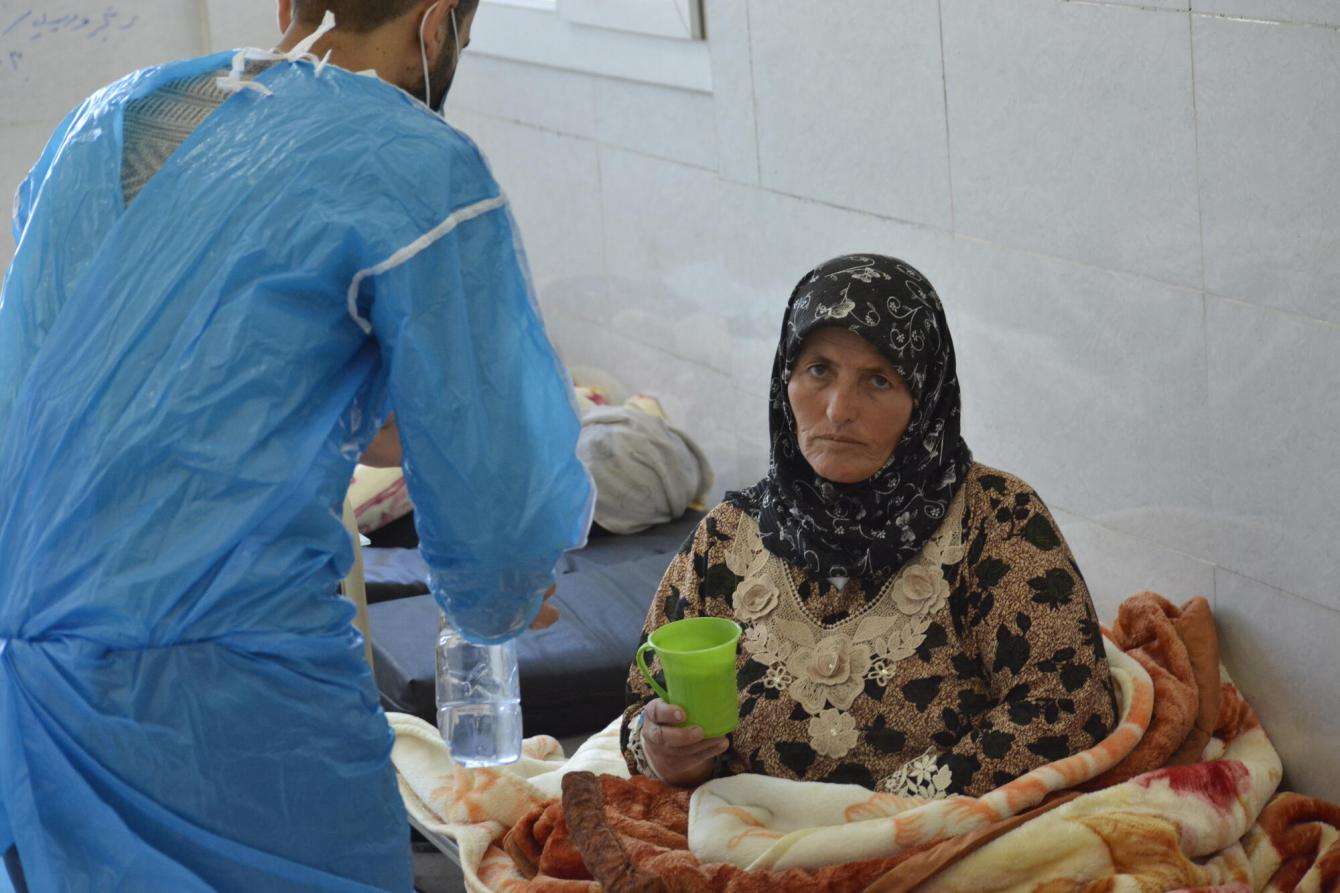
“I came to Raqqa to visit my son several days ago, and then I found myself here,” said Fatina. Having survived the conflict that has battered the region since 2011, Fatina found a new threat looming. “I was first hospitalized at Raqqa National hospital by my family. My condition got worse; I was suffering from a severe headache, diarrhea, and uncontrollable vomiting when I arrived at the CTU. I am not sure why I got so sick, but it felt like I was dying.”
In northeast Syria, MSF is responding to the outbreak in partnership with local health authorities, including providing support to a CTU in Raqqa in a former COVID-19 hospital. We’re also supporting water and sanitation services, including water chlorination and quality monitoring, training of water operators and monitors, and the distribution of 240 hygiene kits. We are also supporting six water stations in the city. In Addition, MSF has donated personal protection equipment (PPE) and ten tons of chlorine.
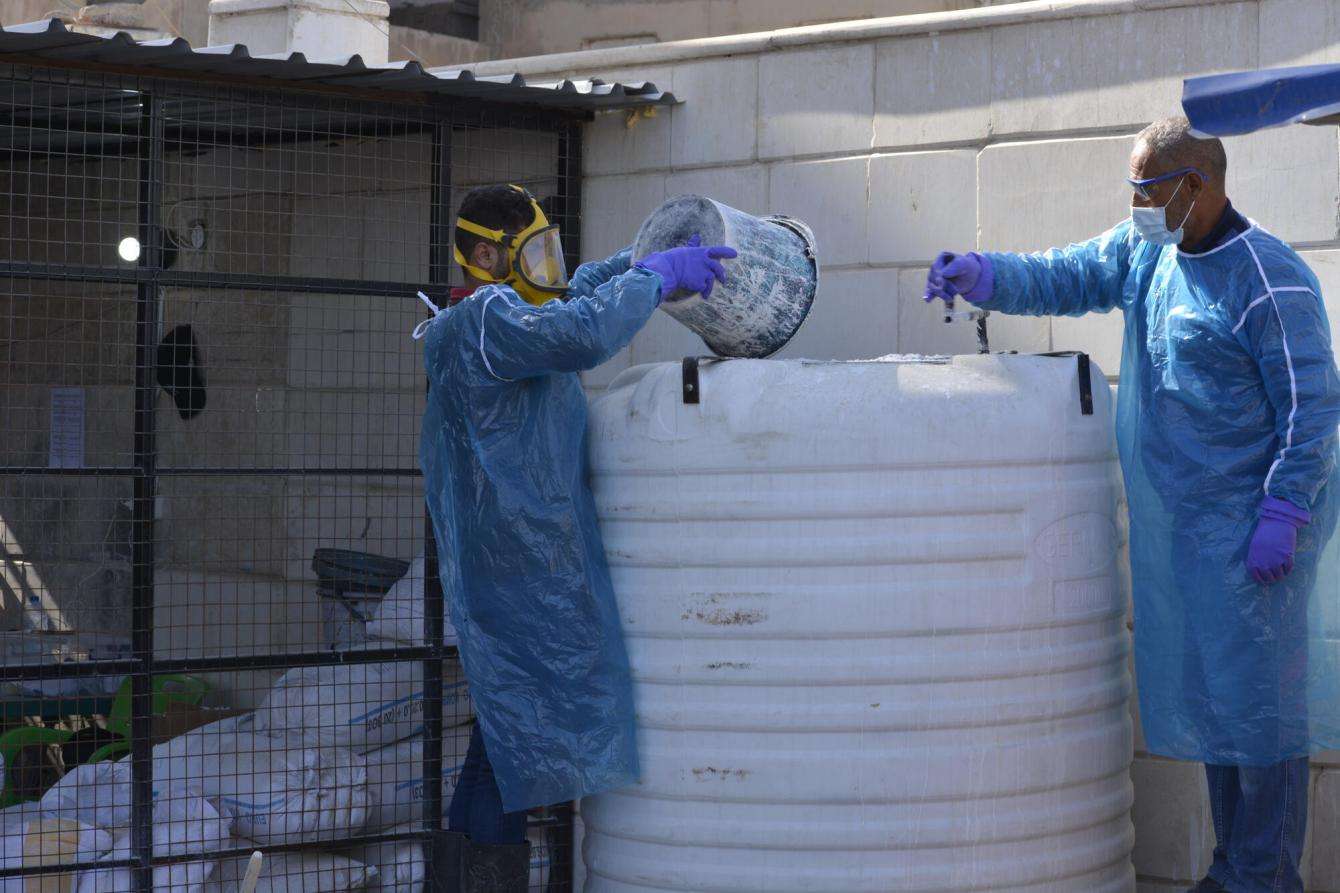
We’re also assessing the situation in Hassakah. Although people there are not dependent on the Euphrates River, water comes from boreholes and is distributed to communities by water trucks. Yet access to clean water can still be challenging, as it is possible for a water truck to unwittingly source contaminated water.
In Tal Abyad and Ras Al-Ain, we are also supporting the Al-Ameen organization to engage the community and distribute hygiene kits to families.
Long journeys to seek treatment
Dalal and her sick son Saleh, who are from the countryside of Raqqa, a few hours' drive away, were referred to the Raqqa CTU just one day ago. She desperately made her way to the center with her severely ill baby, using public transport, and traveling on a minibus. With Saleh losing fluids and getting fainter by the minute, the journey felt like it would never end. A mother of eight, she had to leave her other children with their father.
“I have eight kids—my son, five-month-old Saleh, is the youngest,” said Dalal, who sits on a bed with her son who is peacefully sleeping at the CTU. “He had severe diarrhea a week ago. I thought it might be because of the sheep’s milk but his health deteriorated. I brought him to this center and thanks to God, he is feeling much better now."
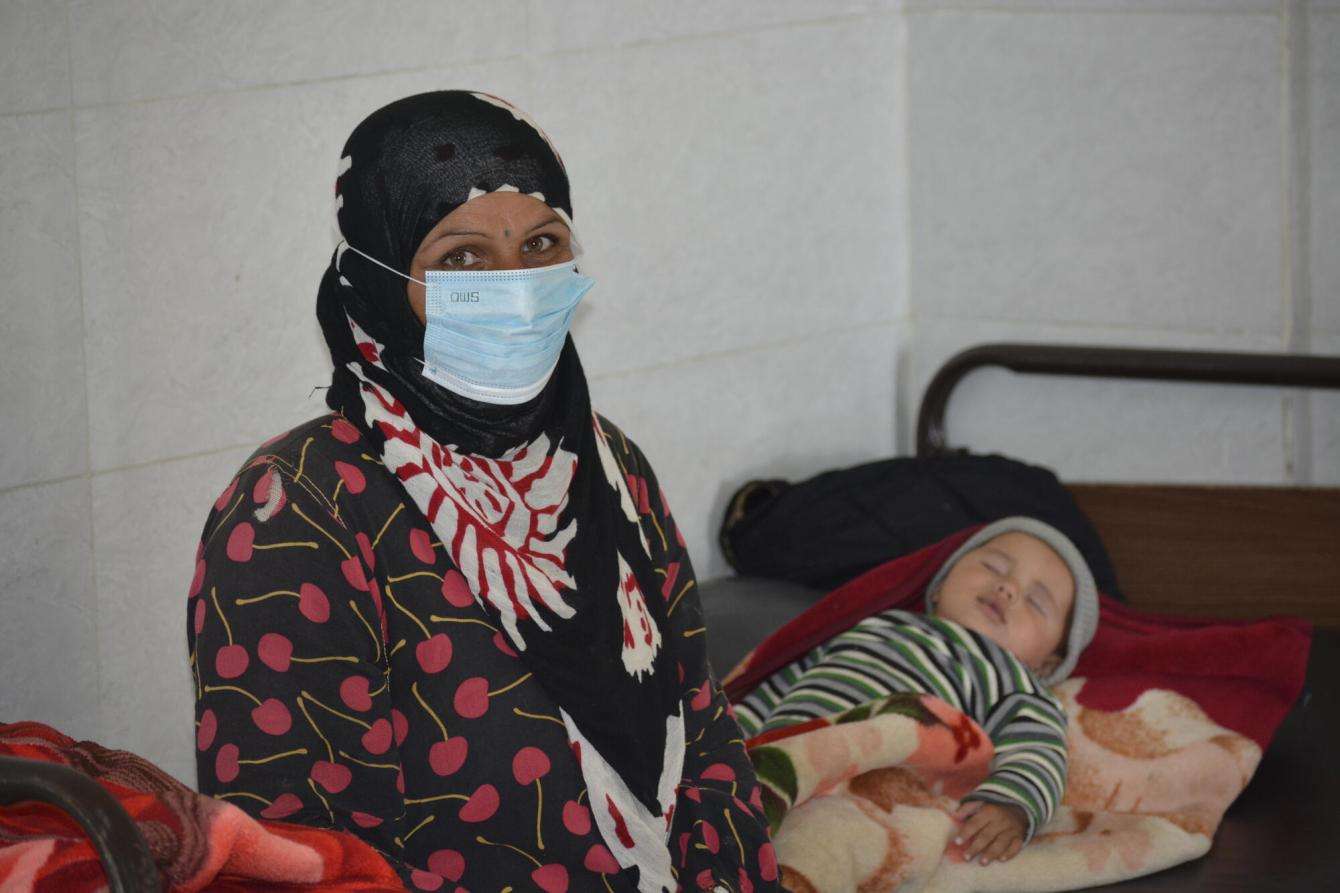
Northwest Syria: Idlib and Aleppo governorates
In Idlib governorate, in northwestern Syria, Alaa Hassan, 30, arrived at the MSF-supported 24-bed CTU, the only unit currently activated in the area, exhausted and ill. “At first, I thought it was just a normal intestine infection, but within hours, my vomiting and diarrhea worsened, I almost passed out, and my blood pressure suddenly dropped,” she said. Her mother-in-law had similar symptoms, but they didn’t know the source of the infection. "I heard about the spread of cholera in Syria, but I did not expect to catch it and suffer from such serious symptoms,” she added. Two days after she was admitted to the CTU, and not long after receiving treatment, all her symptoms had resolved.
In northern Idlib, MSF is also supporting another CTU, and two others in Afrin and Al-Bab, northern Aleppo, in partnership with Al-Ameen Organization. We are also running and supporting four oral rehydration points (ORPs) as the first step in treatment for patients who are showing symptoms but aren’t at the stage that they’d require hospitalization. Around 300 patients have been treated in the ORPs and 220 patients in the CTUs in northern Idlib. Approximately 20 percent of them had severe symptoms, mostly due to a delay in seeking treatment.
Engaging Communities
Across both governorates, MSF is distributing preventive hygiene kits (water jerrycans, soap, and chlorine tablets) to more than 20,000 families in displacement camps, where we also test water. We also distributed around 3,900 aqua tabs to chlorinate water in 17 camps.
Our teams are also conducting community-based health promotion activities and training other health care workers. Our health promotion activities have reached more than 22,000 people.
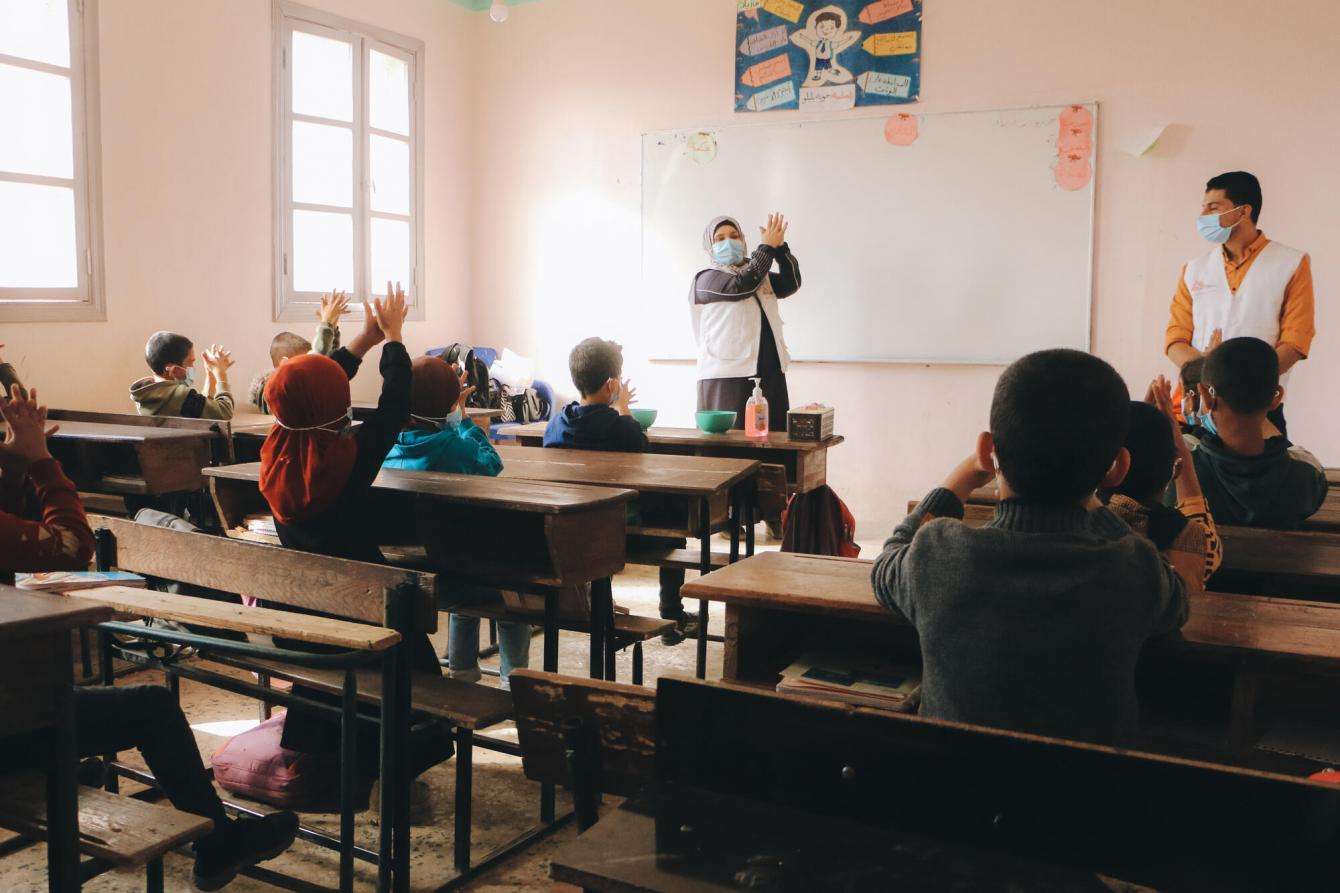
Ahmad Ali is from the Raqqa CTU Health Promotion Team. He is one of a group of community health workers in northeast and northwest Syria who are on-hand to visit patients in their rooms and meet with families to talk about their concerns and answer their questions. They also explain how to recognize the early symptoms of cholera, and what to do if someone suspects that they or a family member has caught the disease.
“Some families in the rural areas in Raqqa were telling me that they were using the water directly from open canals or the river for their household needs and for drinking,” said Ahmad. “This water is contaminated and unsafe and when the nearby water plant isn’t functioning, people will naturally look for other resources, which leads to contracting the disease. We used to see 25 patients on average every day, but [in northeast Syria] cases have markedly decreased. People now know better about how to protect themselves and their families from infection.”
In light of the already dire humanitarian situation in northern Syria, local and international humanitarian organizations are trying to fill the gaps and respond to the many needs, but overall accessibility of sufficient and clean water remains a concerning issue. In 2021, MSF raised concerns that the people's limited access to clean water had reached a breaking point in the region. We are regularly confronted with the health impact of poor water quality, particularly in displacement camps. A lack of access to safe water doesn’t just lead to cholera—it can also fuel the spread of diseases like hepatitis, impetigo, scabies, and many others.
After 11 years of war, a record 14.6 million people in Syria need humanitarian assistance. Syria has the highest number of internally displaced people (IDPs) in the world, with 6.9 million people—most of whom are women and children—displaced from their homes. Many have been forced to flee repeatedly and live in precarious conditions.
MSF operates in Syria where we can, but ongoing insecurity and access constraints continue to severely limit our ability to provide humanitarian assistance that matches the scale of the needs. Our repeated requests for permission to operate in areas controlled by the Syrian government have not been granted. In areas where access could be negotiated, such as northwest and northeast Syria, we run and support hospitals and health centers and we provide health care through mobile clinics.
